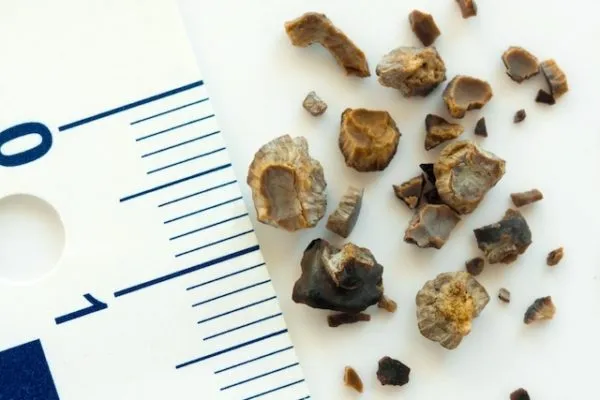A kidney stone, also called a kidney stone, is a mass similar to stones that can form anywhere in the urinary system. Generally, the kidney stone is eliminated through the urine without causing symptoms, but in some cases it can get stuck in the urine channels, causing severe pain and blood in the urine.
Treatment is usually done with fluid intake and medication, and in more severe cases surgery may be necessary.
Kidney stone symptoms
If you suspect you may have kidney stones, select the symptoms:
In some cases, individuals may also experience a lack of urine if the stone obstructs their passage channel.
Kidney Stone Treatment
Treatment for kidney stones is usually done at home and includes rest, fluid intake, and use of medications indicated by the doctor, such as pain relievers or antispasmodics, such as Paracetamol or Buscopan.
In addition, those who have kidney stones should also be careful with their food, avoiding salt and drinking a glass of orange juice every day, for example.
In some cases, patients may opt for laser surgery for kidney stones, which can eliminate stones up to 5 mm, preventing them from getting stuck and causing pain. However, in the most severe cases, hospitalization of the patient for injections of analgesic drugs, such as Tramadol, or surgery for kidney stones may be indicated.

Natural treatment for kidney stone
A good natural treatment for kidney stones is stone-breaking tea because it has a diuretic action and facilitates the elimination of stones.
In most cases, the kidney stone is eliminated naturally through the urine without the person being aware, but in some cases, the stones can block the urinary tract causing great pain and discomfort, in which case it is necessary to go to the hospital as soon as possible.
Causes of kidney stones
The causes of kidney stones, also known as kidney stones, can be related to low fluid intake, food, genetic factor, and can be aggravated due to some diseases. So, some of the causes of kidney stones include:
- Renal calcium calculation: of hereditary origin and should be treated with a diet low in sodium and protein, and diuretics are recommended. Treatment can be done by reducing the consumption of foods rich in oxalate and fat, taking a calcium supplement to facilitate the fixation of oxalate in the intestine.
- Renal calculation of uric acid: it can be caused by the excessive consumption of foods rich in proteins that generate an increase in uric acid in the bloodstream. In this case, treatment can be done with allopurinol and a low-purine diet.
- Renal cystine calculus: of hereditary origin, it can be treated with massive amounts of fluids, alkalis, and D-penicillamine, when necessary.
- Renal struvite stone: it can be caused due to a complication of an infection in the urinary system. Its treatment can be done by taking antibiotics and surgery to remove the stones, as they tend to be large.
When performing the tests that diagnose the kidney stone, the doctor will be able to identify what type of stone the individual has, making an analysis of its composition, and thus indicating the best treatment. For all types of kidney stones, the main recommended treatment is the intake of approximately 3 liters of water per day and plenty of rest, as hospitalization is not always necessary, as the stones can be naturally expelled by the body.
In addition, kidney stones can also be caused by rare diseases such as primary or secondary hyperoxaluria, for example. These diseases promote the accumulation of Oxalate in the body due to deficiencies in some enzymes that would digest this compound, thus overloading the kidneys, which leads to the appearance of stones. These diseases can be treated with probiotic supplements containing the live bacteria Oxalobacter formigenes, which produces energy through the consumption of Oxalate, and is therefore very effective in their elimination.
